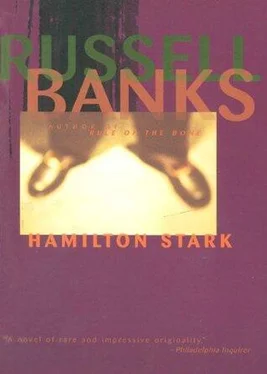It was totally silent, windless, the snow falling straight down, as if being drawn to the ground by the ground itself in some guilty need to hide itself. I left the car and checked the garage door, which was locked. Then I crossed the yard to the front door, determined that it was locked, went up to the side porch and yanked on that door too. Leaning close to the glass to block out my reflection with my shadow, I peered into the kitchen. It was dark inside, but when my eyes had grown used to the darkness, I could see the outlines of the stove, sink, refrigerator, and the small, wooden table and single stool A. had built to replace the Formica-topped table and chairs he had once owned with Dora and that now lay beneath a foot or more of old snow in the field in front, the chromium legs rusting, padding from the seats spilling from rips torn one afternoon last April by high-powered rifle slugs. I could see the calendar on the wall near the telephone. Below the four-color photograph of an oil burner was the sheet for the month of February, for the year 1975—just as it should be. Yet somehow I was surprised. Somehow I had expected to see some other year, some other month. The house seemed to have been deserted long, long ago.
Slowly, I stepped down from the porch and took a few steps into the yard. The only sound was the constant rattle of my own voice inside my own head. The snow was still softly falling, and I couldn’t see clearly more than a few feet in front of me. There was nothing left for me to check, I thought, except the footprints, and that was quite impossible now. Everything was buried under several inches of soft, fresh snow, so that the only footprints I could see were my own. They dribbled along behind me, tiny, crumbling craters slowly filling with new snow. I knew that in a few minutes even these, my own tracks, would disappear. And that would be the end of the “evidence.” Any further pursuit of A. would have to be based solely on abstract reasoning, speculation, empty theory. Or else I simply would have to guess at his whereabouts, randomly placing him here and there, then rushing to seek him here and there, and if he was not to be found at either place, to guess again. I did not want that. No man wants to believe that his life has finally gotten so out of his control that he either must theorize about it or else be forced to guess at its nature. He’d rather believe in magic, fetish objects, totems, dreams. This is how a real life becomes a fiction, I thought, dismayed.
Suddenly, as if remembering a scene from a dream, I remembered driving through the cathedral-like woods on my way over this morning and how, for a few hundred yards, where the branches of the trees wove themselves together overhead, the snow had seemed almost not to be falling. If there had been old tracks on that ground, I thought, footprints laid down beside the road yesterday or the day before, anytime back to the last heavy snowfall, then they would still be visible. Like the faces of type in a printer’s matrix, they could be returned to after the type itself had been destroyed and read again. With a matrix, yesterday’s or last week’s newspaper could as well be today’s or tomorrow’s.
Stepping quickly, almost bounding, around the side of the house to the back, where the second barn and an old chicken house and tool shed were located, I reasoned that if A. or anyone else had decided in the last few days to walk into the woods, for whatever reason, his tracks would probably still be visible near the trees and would remain so until the wind came up and blew the new snow into obliterating drifts. I knew that A.’s habits and routines seldom led him into the woods, so I knew that any trail I saw would be a sign that something out of the ordinary had occurred — and I desperately needed just such a sign at that moment to break the impasse, the painful balance that hung between all the signs of normalcy and all the signs of variance. Of course, I also knew that his habits and routines led him at least once a week to walk up the path to the top of the mountain, so any variation from the tracks that the habitual walk up and back ought to have left would be meaningful, too.
With a hunter’s eye, I scrutinized the exposed, old, packed snow that lay in corrugated sheets beneath the tall pines, cedars and spruce growing along the cleared ground behind the barn and outbuildings. Nothing. Several times I walked back and forth along the edge of the clearing, looking into the woods. Nothing. An occasional rabbit’s trail, the scattered scratches from birds, the small spirals left by squirrels — that was all. Then, as my spirits sank, I came to the path, the narrow defile between the trees and bushes that slowly switch-backed up the gradually rising incline all the way to the top. And there they were — A.’s tracks, his easily recognizable 13 EEEs, each one a yard from the next, leading swiftly from under the smoldering blanket of new snow on the yard directly into the woods and on. This I had, of course, fully expected to see, especially after a weekend, when I knew that A. had made his weekly trek to the top of his mountain, Blue Job, two thousand feet or so above sea level, a huge lump of granite and glacial till that had been his family’s property since the days of the earliest white settlement in the valley. It comprised almost the whole of seven hundred acres for which they had been taxed these two hundred years, that mountain and the three- or four-acre apron at the base of its south face, where the house and fields were located. Except for its lower half, where every fifteen years or so timber could be harvested, the land was not arable. The upper thousand feet of its height, at this latitude, was so close to the tree line and so free of loose soil that it was almost completely clear of vegetation — a gray gnarl of rock and bony plate and crevice.
I took a short step onto the path, and the snow suddenly seemed to cease falling. My vision cleared as if a screen had been removed from before my eyes. I straightened and peered around for the second set of tracks, A.’s return set. But there was none! How could that be? If he’d gone up, then he must have left tracks coming down. There was no other route for him, up or down, especially at this time of year. The northern slope was precipitous and notched with crevices and sheer drops of hundreds of feet onto ledges and broken shards of stone. The east and west slopes, once you got off the knob, no easy descent, and entered the trees, were practically impenetrably dense with low scrub brush and face-whipping birches left from the last timbering. Besides, they eventually flattened into fields that were owned by other people, people A. had refused to permit to trespass on his property. He was not very likely to trespass on theirs, not unless he was in the direst of circumstances, and probably not even then.
But how to explain the presence before me of tracks leading up the mountain, and no tracks leading down?
I could not answer my own question. Emphatically I decided again that there would be no more speculation. I would follow the tracks through the woods to the rock, and I would follow what I knew was A.’s usual path across the rocks the rest of the way to the top. I knew that my answer lay there, at the wind-blown top of the mountain, not here below, in the shelter of the forest.
I pulled my cap over my ears, gave my gloves a tug, and started trudging uphill along the path, first easterly, then westerly, switchbacking through the trees. As I ascended, the trees became shorter and more twisted, and soon I could see patches of gray sky over me and fresh snow falling on the path. In a short while, the trees were not much higher than my head, briary Scotch pine and dwarfed and gnarled spruce, and when I looked down to check on A.’s tracks, I could no longer see them, for the snow was by then falling heavily on me and on the path, erasing my own tracks behind me as quickly as, a few minutes before, it had erased A.’s. But I was familiar with the path, had walked it many times before, and I knew that A. had come this far and that he must have gone on, so I continued to climb. It became more difficult, for I was out of the trees altogether, and the path was rougher and more circuitous as it wound around huge boulders and skirted short but dangerous drops. The new snow on the old, hardened snow below made my footing less sure. Several times I slipped and almost fell, and once I kept myself from tumbling back down a steep stretch of the path only by pulling myself forward with my hands on a long, jagged outcropping adjacent to the path. The wind was high now, and it whipped the snow against me in wet, adhesive sheets, plastering my hat and coat and face. I could not see more than a dozen feet in front of me and then only when the wind momentarily hitched or shifted and blew the snow from behind me. My progress was slow, I knew, but I didn’t have much farther to go. I had reached the crown, where the path abruptly steepened for a final hundred and fifty feet and then leveled off at the top. Increasing my effort, even though I was panting like a racer and, despite the cold and the wind, sweating heavily, I made the final scramble to the top, where I finally came to rest on the table-sized ring of flat stone there. I could see nothing that I could not reach out and touch. The snow had covered my entire body and had turned all but the red sun of my face as white as the whirling white space that surrounded me. If there had been another human face on that high flat table top, that altar, I would have seen it, I would have fallen to my knees before it, for I would have seen nothing else but that face. But there was no other human face there to match mine. I was alone, completely alone. I knew that if I took another step, I would walk off the altar into empty space, a swirl of white, and then nothing. Nothing. Unimaginable nothing . I turned slowly around and began the descent.
Читать дальше












